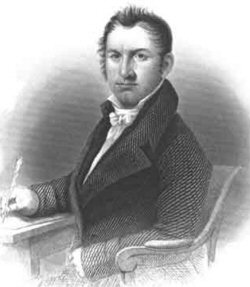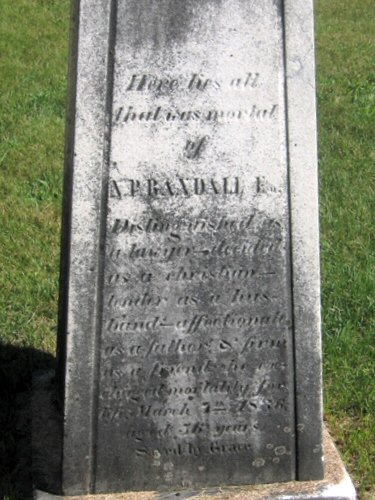Notes for NICHOLAS PHILLIPS RANDALL:
Son of Nicholas and Content (Phillips) Randall.
Born: July 25, 1779 in Voluntown, New London County, Connecticut.
Died: March 7, 1836 in Manlius, Onodaga County, New York.
Buried: Christ Church Cemetery, Manlius, Onondaga County, New York.
Census: 1830 - Manlius, Onodaga County, New York.
Occupation: Judge.
Married: (1) Sally Bristol About 1804 in Voluntown, New London County, Connecticut.
(2) Belvidera Hichock 1816 in Manlius, Onodaga County, New York.
(3) Eliza Norman 1819 in Manlius, Onodaga County, New York.
(4) Sybil Dyer February 14, 1823 in Manlius, Onodaga County, New York.
There was a son who died 2 months after Nicholas Dyer was born. Mother unknown.
NICHOLAS P. RANDALL.--The subject of this sketch, was born at Stonington, Connecticut, July 25th, 1779. At the age fifteen, he resolved upon securing the benefits of a thorough education. His father not being in possession of a fortune sufficient for securing so valuable a blessing to a numerous family, he was by fortuitous circumstances, thrown entirely upon his own resources. By perseverance, application and industry, he secured the means of acquiring a complete classical education by his personal efforts, and finally graduated with distinguished honor, at Yale College, in the class of 1803.
Directly after the completion of his classical course, he entered the law office of Messrs. Hotchkiss & Simons, at Clinton, Oneida County, where he continued until his professional studies were concluded, when he was admitted to the Bar. In 1807, he located at New Hartford, Oneida County, opened a law office and there continued the practice, till sometime in 1811, when he removed to Manlius village and entered into partnership with James O. Wattles, Esq., which partnership, after a short period was dissolved.
From his activity of mind, acute legal penetration, profound investigation and untiring devotion to the interests of his clients, he soon became distinguished as a lawyer, which drew to his office many of the most important causes which were to be tried in the courts of the county, and in the Supreme Court, and Court of Chancery, of the State of New-York, and perhaps no one labored with more assiduity, or was more successful, in maintaining the causes in which he was retained as counsel. Endowed by nature, with mental powers of a high order, which were eminently improved by study, industry and perseverance, he abhorred all deceit and chicanery in business matters, incident to a lower order of minds, and was entirely above the low ambition of securing to himself a great number of clients, by misrepresentation or artifice. His ambition, (if we may be allowed the expression,) was grounded in integrity, and in a desire to excel in his profession. Mr. Randall excelled in that most exalted of all qualities--sound, sterling common sense, which, with his acknowledged candor and urbanity, gave him an uncommon influence with the Bench and with juries; which few men, however much they might have surpassed him in fluency of speech or oratorical arts, attained.
The character of Mr. Randall's genius, was original. He acted and thought for himself. With a mind, independent and decisive, he copied after no man, and it is no mean proof of the strength and solidity of his judgment, that his counsel was so often sought, and received with so much deference, and his professional celebrity stood so high. As he had ability to think, so had he also, the moral courage to follow the convictions of his own mind. But these faculties in a man actively engaged in the business of life, failed not to bring him into collision with many, who had not the judgment or discrimination to appreciate his motives, or honesty enough to commend his decided course. These transcendent principles, however, could not fail to impart to himself, and his immediate friends, the highest sources of enjoyment, and he often had the satisfaction of receiving the gratulations of those who from prejudice or ignorance, made erroneous estimates of his motives. The arduous duties of his profession, did not prevent his engaging in agricultural pursuits. In his youth, he had been inured to the labors of a farm, and in after years, from choice, entered into both the theoretical and practical operations of agriculture, with all the zeal and ardor of one depending entirely upon its results, for profit and support. His farm, though small, was a pattern of neatness, order and thrift, and none knew better or practiced more perfectly the principles of this science; presenting an example in the highest degree encouraging to useful industry. His garden was stored with trees of choicest fruit, planted by his own hand, and the sweetest flowers shed their fragrant odors around his dwelling, nurtured by his care. Mr. Randall was always among the foremost in aiding and advancing the cause of education, in all its various branches, and was active in effecting the incorporation of Manlius Academy, and was one of its principal founders.
In private life, Mr. Randall was social, amiable and agreeable, and although the requirements of business occupied much of his time, there were few men who could, with more dignity and grace, contribute to the refined enjoyments of the social circle, or afford more rational and solid information, upon the varied subjects with which he was familiar. He was endowed with a vein of pleasantry, which occasionally evinced itself in the humorous, yet never detracted from his dignity. His friends always perfectly at ease with him, were never known to treat him with degrading familiarity. Their regard and respect for him equally forbade it. His conversation was stately, instructive and delightful; his deportment dignified and gentlemanly, and his character without reproach.
In his Christian character, he was remarkable for his zeal, prudence and fidelity. He took not his creed upon trust. He weighed the claims of Revelation, and the various branches of the Christian family; and in the preference which he gave to the communion of his adoption, he acted upon the sober dictates of an enlightened judgment and an honest heart. Hence, as might have been expected, he continued without wavering, steadfast unto the end.
For many years, he filled the stations of vestryman, and warden of the Protestant Episcopal Church at Manlius, the latter of which he held at the time of his death. His religious experience, in view of his approaching dissolution, partook of the same rational nature. Harassed by no fears without, and an approving conscience within, he calmly resigned his soul to the hands of his Maker, without any anxiety as to the issue.
After a long and tedious illness, which he bore with truly Christian fortitude, he died at his residence, in Manlius Village, on the 7th of March, 1836, in the fifty-seventh year of his age. The mournful intelligence was every where received with feelings of sorrow and regret. The Bar of Onondaga County, called a meeting, and passed the following resolutions of condolence and respect:
At a meeting of the members of the Bar of the county of Onondaga, held at the Court-House, in the village of Syracuse, on the 29th day of March, A. D. 1836, for the purpose of paying a tribute of respect to the memory of Nicholas P. Randall, Esq., one of the members of said Bar, recently deceased, the Hon. Daniel Moseley, Judge of the Seventh Circuit, was called to the Chair, assisted by their Honors, John Watson, George Petit and Otis Bigelow, Judges of the Court of Common Pleas of said county, and J. G. Forbes, Esq., was appointed Secretary.
James R. Lawrence, Esq., from a Committee appointed by the Chair, consisting of Messrs. Lawrence, Watson, Birdseye, and Jewett, reported the following resolutions, which were unanimously adopted: Resolved, That the member of the Court and Bar of the county of Onondaga, have received, with painful emotions, information of the death of Nicholas P. Randall, Esq., for many years a prominent member of the Bar of this county.
Resolved, That the high legal and scientific attainments, and the uniform fidelity and ability which Mr. Randall devoted to the maintenance and protection of the rights and interests of his clients, and to the elucidation of law and equity, have deservedly gained for him a high standing, in a useful and honorable profession; and while we deplore his death as a public loss, we sympathize with his family and friends, that they have been called upon to part with one long endeared to them, not only by eminent public usefulness, but by high moral qualities, and an amiable domestic character.
Resolved, That these resolutions be signed by the Chairman and Secretary of this meeting--that by permission they be entered upon the minutes of the Court, and a copy be transmitted by his Honor, the Circuit Judge, to the family of the deceased, and also that they be published in the newspapers of the county. DANIEL MOSELEY, Chairman.
J. G. FORBES, Secretary."
The loss of so distinguished a man, necessarily created deep sensations in the community in which he had lived, and to whom he had become endeared.
The house of mourning was surrounded by his neighbors and numerous friends, who could scarcely credit the reality of his death. The funeral obsequies were prepared, and his remains conveyed to the tomb, amid all the solemnities that respond to the deepest sorrow, with which every heart was afflicted by this dispensation of providence. His career has left us a splendid and animating example, which points the way to usefulness and fame, and shows how great are the acquirements which well directed perseverance and industry are able to achieve, and what honors and rewards are the happy results.
(Source: Rootsweb.com)

